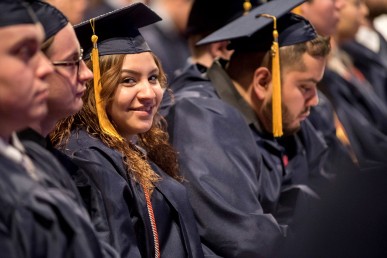$5M federal grant to help UIC graduate more Latino scientists, engineers
The University of Illinois at Chicago has received a five-year, $5.3 million grant from the U.S. Department of Education affirming the designation of the university as a Hispanic-Serving Institution.
The grant, from the Education Department’s Hispanic-Serving Institutions–Science, Technology, Engineering, or Mathematics (HSI-STEM) and Articulation Programs, is aimed at augmenting UIC’s efforts to increase the number of Latino and low-income students attaining degrees in STEM fields.
UIC is one of only two institutions among the 91 receiving HSI-STEM grants that is classified by the Carnegie Foundation as a doctoral institution with the highest level of research activity.
“UIC provides top-notch STEM education to Latino students,” says Susan Poser, provost and vice chancellor for academic affairs. “Our undergraduate Latino students have the opportunity to participate in a wealth of research opportunities with nationally recognized faculty, so that by the time they graduate, they will have gained experience that is often reserved for graduate students.
“UIC’s mission is to provide the highest levels of teaching and intellectual excellence to all students,” Poser said. “This grant gives us more tools to help us to provide even broader access to fulfill this mission.”
The U.S. needs about a million more STEM professionals to remain globally competitive, says Aixa Alfonso, associate professor of biological sciences at UIC and principal investigator on the HSI-STEM grant, citing 2012 findings of the President’s Council of Advisors on Science and Technology. Reaching that goal requires the country to graduate more than a third more scientists and engineers than are currently earning STEM degrees.
“We need people, and we are an increasing proportion of the population,” Alfonso said, referring to scientists and engineers in the first case, and Latinas and Latinos in the second. Although Latinos and Latinas now make up 15 percent of the adult population in the U.S., they comprise only 6 percent of the STEM workforce.
“We need to address that gap,” Alfonso said.
“At UIC, as elsewhere in the country, we have many Latino students who come here intending to have careers in STEM fields, but we lose them after the first year,” she said. “They tend to switch majors or not graduate.”
Nationally, 42 percent of Latino freshmen intended to major in a STEM field, slightly above the average of all groups, according to the National Science Board. However, they receive only 10 percent of STEM degrees, even though they account for 21 percent of the 18-24 population.
Many factors contribute to Latino attrition from STEM fields, Alfonso said. At UIC, a 2015 survey of over 500 Latino students showed 58 percent were first in their family to attend college; 65 percent were eligible for federal Pell grants or receiving state financial support; and 46 percent were working 21 to 30 hours a week to support themselves or their families.
“We’re taking a multipronged approach,” Alfonso said. “We want to increase the proportion of Latino students who apply and are admitted to UIC in STEM fields, and once here, we want to help them succeed.”
UIC calls its initiative Latinos Gaining Access to Networks for Advancement in Science, or LAS GANAS (“the desire”). The program will provide academic support and coaching to Latino undergraduates who have an interest in STEM fields. The LAS GANAS program will support the students’ strong ties to their heritage as Latinas and Latinos, Alfonso said, as well as their emerging identities as scientists.
UIC’s plans call for an innovative, model program that not only supports the success of Latino STEM students at UIC, but also “engages the Latino community on campus to increase levels of science literacy,” Alfonso said.
During the grant period, LAS GANAS will focus on Latino undergraduates in biological science degree programs, with a long-term goal to scale up the program to other STEM disciplines across the university, Alfonso said. Co-principal investigators for LAS GANAS are Dr. Jorge Girotti, associate dean and director of admissions in the UIC College of Medicine; Bernard Santarsiero, director of the Research Resources Center and research professor in the Center for Biomolecular Sciences; and Susan Farruggia, assistant vice provost for undergraduate affairs.
To improve academic outcomes, the program will include five components shown to be effective: opportunities for undergraduate research with faculty mentors; holistic academic support and advising; support networks of faculty and peers; collaborative learning opportunities; and financial support.
To increase Latino STEM enrollments and raise science literacy, the program will work with other UIC units to expand recruiting in high schools and community colleges that serve large Latino populations. To facilitate the transfer of Latino college students, LAS GANAS will work with the City Colleges of Chicago to develop model transfer and articulation agreements.
UIC is one of the nation’s most diverse university campuses, with no ethnic majority in its student body. Its Latino undergraduate enrollment climbed above 25 percent for the first time in 2014, making it eligible for Education Department designation as a Hispanic-Serving Institution. That same year, UIC’s Latin American Recruitment and Educational Services program was named the nation’s top program for increasing achievement for Latino undergraduate students by Excelencia in Education, a national nonprofit. Latino undergraduate enrollment this fall reached 31 percent.


